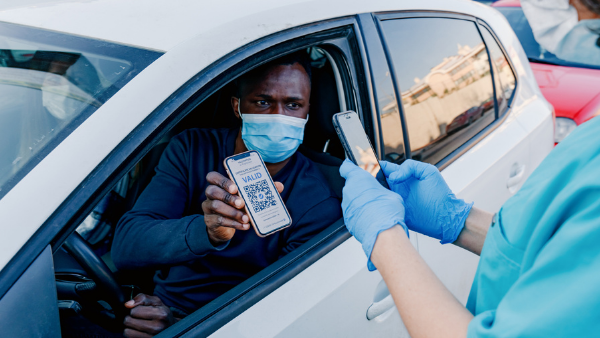Related people
Kate Gardner
Partner

The Department of Health and Social Care (DHSC) has published guidance for those who require official proof that they are unable to be vaccinated against coronavirus. This comes as the government continues to encourage the use of the NHS Covid Pass and introduces its mandatory use in certain sectors.
The NHS Covid Pass was introduced by the Government as a tool to help manage the risks of Covid-19 (covid) and to prepare for a national mandatory introduction if required.
The NHS Covid Pass enables individuals to share their coronavirus vaccination records, test results or exemptions in a secure way. This is most used for travelling abroad or for entry into certain venues.
Further to our previous article “No Jab? No Job!” there is still no government legislation which can allow employers to mandate the vaccination of their staff. Nevertheless, certain sectors have existing legislation, such as the Health and Social Care Act 2008, which allows for the mandatory vaccination of staff. Going forwards, the NHS Covid Pass could be used by employers to ensure that their staff have the necessary vaccinations or exemptions to continue to work. This primarily affects the health and social care sectors, but could become more widely used in other sectors, such as hospitality and events.
The following are examples of individuals who are medically exempt from the Covid-19 vaccine:
Another exemption is where a resident in England has taken part, or is taking part, in a covid vaccine clinical trial. These individuals will be able to use the NHS Covid Pass to access their vaccine records in the same way as others who have been vaccinated.
Brief exemptions are also available for those with short-term medical conditions or pregnancy.
At the moment individuals can show their reason for exemption of the vaccine either through the NHS Covid Pass or a self-certification form. Currently, businesses have the discretion to accept individuals who self-declare their exemption. However, from mid-December 2021, the NHS Covid Pass will be required to gain entry as with those who are fully vaccinated.
The NHS Covid Pass will not show that an individual is medically unable to be vaccinated. Instead, it will look and work the same for those with medical exemptions as those who are fully vaccinated.
It is likely that the NHS Covid Pass will continue to be used by many industries for the foreseeable future. Whilst the NHS Covid Pass is a good platform for employers to see which of their employees have been vaccinated or are exempt, it can carry certain risks.
As highlighted in our previous article above, there are risks that mandating the vaccine for staff and dismissing those who are not vaccinated, or exempt, could lead to claims of unfair dismissal. Similarly, our article on withholding sick-pay highlights the risks of discrimination or breach of contract claims where employees are not given their usual sick-pay when required to self-isolate as they have not been fully vaccinated.
Many employers may withhold sick-pay or decide to dismiss staff who have not been vaccinated as a means of encouraging vaccine uptake and prevent the risk of harm to the rest of their workforce. However, this should be balanced against potential discrimination claims and concerns over breaches in human and ethical rights.
This article is for information purposes only and is not a substitute for legal advice and should not be relied upon as such.